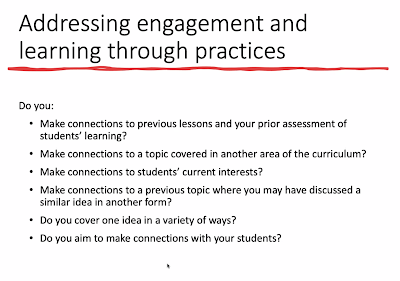Just in Time Maths (with Rob)
Last week I attended a couple more sessions of maths PLD with Rob. The first was an 'open invite' zoom hui session - he's run a series of these. This one was looking at engagement and diversity.
1. using ARBs (Assessment Resource Banks). Rob's first guest was Jonathan Fisher from NZCER. He explained that ARBs support evidence-based teaching and learning practices. They are targeted assessment tasks and many suggest ideas for next teaching steps. For more info you can go 'about the arbs'. Arbs are flexible assessment tools - e.g we might use some of the multi-choice questions for a diagnostic move'n'prove activity, use them for small group explicit instruction or use for consolidating learning. Many can be done online or on paper. They support teachers build pedagogical and content knowledge. Also - the researchers working on these tools really appreciate any feedback. A next step for me is to explore the conceptual maps within the arbs platform which I'd not noticed before.
2. Professor Catherine Attard specialises in student engagement in maths.
The second session with Rob was was looking at Balancing Assessment - thinking about what we are assessing and creating balance. This session prompted a lot of thought about assessment. Rob posed the question whether our assessment gives the right message about what we value - when we think about all the skills and processes and dispositions in maths - do we value and recognise that student may be good at explaining their thinking, or persevering or collaborating with others etc.
The purpose of assessment is to move learning forward - what do our students know and where to next? Gathering data tells us nothing - it's the analysing and how we intervene and feed forward that is valuable. We need to seek out assessment tools that foster this. Formative assessment informs the future direction of the learning.
Rob shared this example of a responsive, intentional cycle of assessment:
I was interested in the discussion around GLoSS testing as at our school this currently holds a lot of weight in our OTJs. Rob talked about how a GLoSS will show you what students can do but there's not many opportunities for thinking mathematically and it is not authentic. The stage a student comes out at in a GLoSS is not enough information in itself to make a judgement about what level a student is working at.
Rob suggested one way to improve teacher capability in assessment was to get to know the milestones within the Learning Progression Framework. So for example we might get together and look at a milestone for multiplicative thinking (which will contain illustrations/exemplars of learning at each level), visualise what students should be doing - what does it look like to be at level 1 etc.
Rob recommended taking time to have a play and trying things out and not making changes too quickly. So for example you might have a goal maths pld will reduce assessment load and that by the end of 2022 teachers are comfortable and confident to use Learning Progressions formatively.
This was the last of the Ministry funded sessions with Rob. It's been really practical and supportive PLD. Rob has offered and pointed us towards awesome resources and tools.
All teachers are welcome to join the Facebook group he runs - Maths - Ideas and insights TLF








Comments
Post a Comment